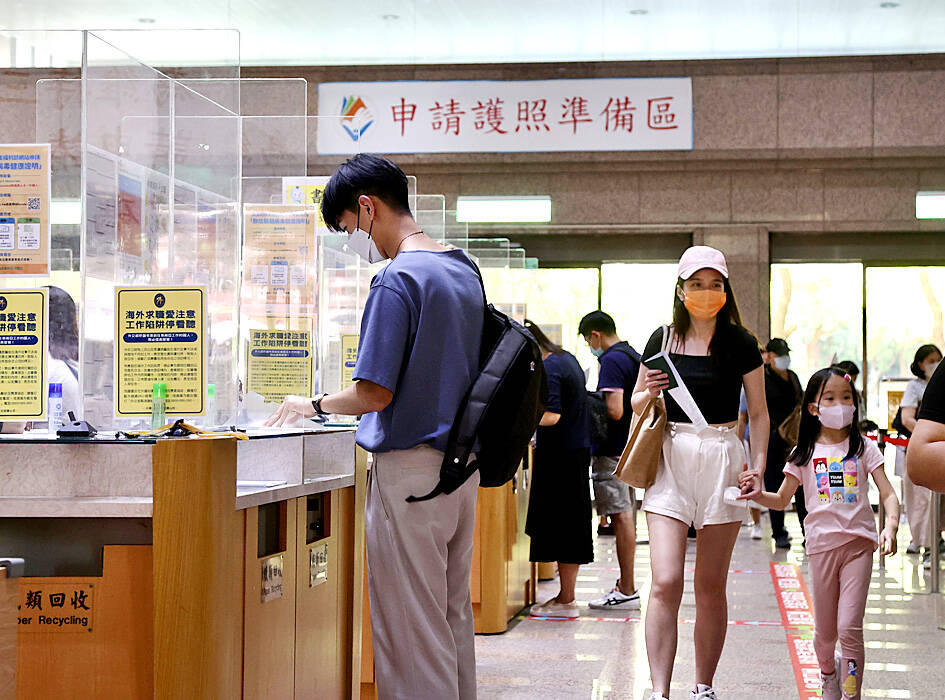Travel agencies and hoteliers are anticipating that pent-up demand for travel would spur sharp revenue growth after Taiwan reopens its borders to inbound and outbound travelers on Oct. 13.
The Executive Yuan on Thursday announced that on Oct. 13 it would further relax entry rules to include countries or territories with which Taiwan does not have visa-waiver agreements and end the quarantine requirement for visitors, with a weekly cap on the number of inbound visitors set at 150,000.
To capitalize on the reopening, Lion Travel Service Co (雄獅旅遊) in a statement on Thursday said that it had rolled out tours to Japan, South Korea, Southeast Asia, North America and Europe, in addition to free visa applications for people on non-discount tours.

Photo: CNA
Lion Travel spokeswoman Lai Yi-ching (賴一青) said that Japan was the most popular destination for tour groups and the company had secured about 30,000 tickets for China Airlines Ltd (中華航空) and TigerAir Taiwan Ltd (台灣虎航) chartered flights to the nation.
Some popular upcoming attractions for tours in Japan include skiing, hot springs and New Year’s Eve events, she said, adding that many people have inquired about prices for trips during the Lunar New Year holiday in January next year.
Phoenix Tours International Inc (鳳凰國際旅行社) forecast that tourism revenue this quarter would rebound to 50 to 60 percent of pre-COVID-19 pandemic levels.
The revival of the tourism industry would likely be a gradual process, taking six months to a year, Phoenix Tours International said in a statement.
Cola Tour (可樂旅遊) said in a statement that more than 10,000 people have purchased tours since it rolled out discounts on Thursday last week when the Cabinet announced plans to reopen the borders, with the US, Japan, South Korea, Thailand and Singapore being the most popular destinations.
KKday, a company selling local package tours and tickets to overseas tourist attractions, said in a statement that flight ticket sales for foreign destinations had increased by 80 percent, with Japan being the most popular destination.
In addition, it has developed numerous local tours in anticipation of a rise in tourist arrivals, hoping the number of foreign visitors would double next year, KKday said.
The Silks Hotel Group (晶華酒店集團) said in a statement that before the pandemic began in early 2020, 85 percent of Regent Taipei hotel’s revenue had come from foreign visitors.
After the government closed the borders, the hotelier had to introduce deals to attract local guests, but that only boosted its revenue to 40 to 50 percent of pre-COVID-19 levels, the group said.
The reopening is expected to spur a gradual increase in the number of foreign guests to match that of local guests, as next month and December is a peak period for arrivals, it said.
The Fleur De Chine Hotel (雲品酒店) expressed similar views in a statement.
The Courtyard by Marriott Hotel (萬怡酒店) said in a statement that the lifting of border controls would provide much-needed relief after a long dry spell, while touting its location in the same building in Taipei as Nangang MRT Station, the High Speed Rail’s Nangang Station and the Taiwan Railways Administration’s Nangang Station.

PATENTS: MediaTek Inc said it would not comment on ongoing legal cases, but does not expect the legal action by Huawei to affect its business operations Smartphone integrated chips designer MediaTek Inc (聯發科) on Friday said that a lawsuit filed by Chinese smartphone brand Huawei Technologies Co (華為) over alleged patent infringements would have little impact on its operations. In an announcement posted on the Taiwan Stock Exchange, MediaTek said that it would not comment on an ongoing legal case. However, the company said that Huawei’s legal action would have little impact on its operations. MediaTek’s statement came after China-based PRIP Research said on Thursday that Huawei filed a lawsuit with a Chinese district court claiming that MediaTek infringed on its patents. The infringement mentioned in the lawsuit likely involved

Taipei is today suspending work, classes and its US$2.4 trillion stock market as Typhoon Gaemi approaches Taiwan with strong winds and heavy rain. The nation is not conducting securities, currency or fixed income trading, statements from its stock and currency exchanges said. Authorities had yesterday issued a warning that the storm could affect people on land and canceled some ship crossings and domestic flights. Taiwan Semiconductor Manufacturing Co (TSMC, 台積電) expects its local chipmaking fabs to maintain normal production, the company said in an e-mailed statement. The main chipmaker for Apple Inc and Nvidia Corp said it has activated routine typhoon alert

GROWTH: TSMC increased its projected revenue growth for this year to more than 25 percent, citing stronger-than-expected demand for AI devices and smartphones The Taiwan Institute of Economic Research (TIER, 台灣經濟研究院) yesterday raised its forecast for Taiwan’s GDP growth this year from 3.29 percent to 3.85 percent, as exports and private investment recovered faster than it predicted three months ago. The Taipei-based think tank also expects that Taiwan would see a 8.19 percent increase in exports this year, better than the 7.55 percent it projected in April, as US technology giants spent more money on artificial intelligence (AI) infrastructure and development. “There will be more AI servers going forward, but it remains to be seen if the momentum would extend to personal computers, smartphones and

Catastrophic computer outages caused by a software update from one company have once again exposed the dangers of global technological dependence on a handful of players, experts said on Friday. A flawed update sent out by the little-known security firm CrowdStrike Holdings Inc brought airlines, TV stations and myriad other aspects of daily life to a standstill. The outages affected companies or individuals that use CrowdStrike on the Microsoft Inc’s Windows platform. When they applied the update, the incompatible software crashed computers into a frozen state known as the “blue screen of death.” “Today CrowdStrike has become a household name, but not in